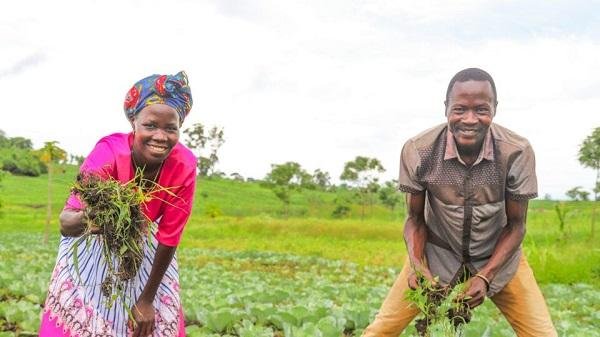News
Let’s revisit Nkrumah’s agric vision of self-reliance – Agric expert

Ghana should honour founding President, Dr Kwame Nkrumah, by revitalising the country’s agricultural sector rather than building monuments, the Chief Executive Officer of Legacy Farms, Mr Amos Rutherford Azinu, has said.
According to Mr Azinu, the most fitting tribute to Nkrumah would be fulfilling his vision of agricultural self-reliance by maximising the potential of infrastructure projects like the Volta River system.
“The most meaningful way to honour Kwame Nkrumah is not with another statue or renamed street, but with a national commitment to fulfil his agricultural vision,” Mr Azinu said in a statement marking Nkrumah’s birthday celebration.
The Legacy Farms CEO pointed out that when Nkrumah conceived the Volta River Project in the 1960s, he was laying infrastructure for Ghana’s agricultural transformation, not just generating electricity.
“The creation of Lake Volta was a masterstroke of long-term thinking that provided the foundation for irrigation, fishing, and rural development that could have fed and enriched the nation for generations,” he noted.
Despite this infrastructure, Ghana currently imports billions of dollars’ worth of food annually that could be produced domestically.
The country imports rice while irrigation systems remain underutilised, imports tomatoes while farmers struggle with post-harvest losses, and imports fish while Lake Volta holds untapped aquaculture potential.
Mr Azinu outlined a four-point strategy for agricultural renaissance: maximising the Volta River’s irrigation potential to transform northern regions into the nation’s food basket; investing in rural infrastructure including roads, storage facilities, and processing centres; supporting smallholder farmers with access to credit, technology, and markets; and embracing modern farming technology including precision agriculture and digital platforms.
The agricultural executive noted that Ghana spends over $2 billion annually on food imports, arguing that redirecting even a portion of this spending toward domestic agricultural development would create jobs and reduce foreign exchange pressure.
“As climate change threatens food security across Africa, and as global supply chains prove increasingly fragile, Nkrumah’s vision of agricultural self-reliance appears more prescient than ever,” Mr Azinu said.
From Kingsley E. Hope, Kumasi
News
Man sentenced to 25 years for robbery at Manso Akwasiso

A 30-year-old man has been sentenced to 25 years imprisonment with hard labour by the Bekwai Circuit Court for his role in a 2022 robbery at a mining site at Manso Akwasiso in the Ashanti South Region.
The convict, Dominic Ofori, also known as Fanta, was arrested on 16th February 2026 after years on the run. He pleaded guilty before the Bekwai Circuit Court to robbery contrary to Section 149 of the Criminal Offences Act, 1960 Act 29, and was accordingly sentenced to 25 years imprisonment with hard labour.
On March 20, 2022, the Manso Adubia District Police received intelligence that a group of armed men from Manso Abodom were planning to attack a mining site at Manso Akwasiso to rob the owner of gold concentrate. Acting on the information, police mounted a coordinated operation and laid an ambush at the site.
At about 5:30 pm the same day, four-armed men arrived at the site, fired indiscriminately, and robbed the miners of their gold concentrate. The police team on surveillance intervened, resulting in an exchange of gunfire.
Three of the suspects, Abu Abubakar, Musah Latif, and Gideon Takyi, sustained gunshot wounds and were pronounced dead on arrival at St Martins Catholic Hospital at Agroyesum. Dominic Ofori escaped at the time but was later arrested and put before the court.
The Ashanti South Regional Police Command has assured the public of its continued commitment to combating violent crimes and bringing offenders to justice.
News
Ashanti police arrest man for publishing false news on TikTok

The Ashanti Regional Police Command has arrested 45-year-old Isaac Boafo, also known as “Duabo King,” for allegedly publishing false news intended to cause fear and panic.
Police said the arrest follows a viral TikTok video in which Boafo claimed that four officers at the Central Police Station in Kumasi engaged in inappropriate conduct with commercial sex workers during night patrols in Asafo.
Officers from the Police Intelligence Directorate (Ashanti Region) apprehended Boafo after receiving intelligence about the video.
During questioning, he admitted to creating the video to attract views and engagement online, and acknowledged that he could not prove the allegations.
Boafo also admitted making comments about the President of the Republic for content purposes and could not defend those statements.
He has been formally charged and is in detention as investigations continue.
The Ashanti Regional Police have warned the public against publishing or sharing false information on social media, noting that such acts can cause fear, panic, and damage reputations.
They said anyone found engaging in similar conduct will face legal action.
By: Jacob Aggrey














